I'm trying to get simple example of springboot and camel working but come undone. Not sure what i'm doing wrong. in the gradle build i've included so far
dependencies {
compile 'org.apache.camel:camel-spring-boot-starter:2.18.4'
compile 'org.apache.camel:camel-groovy:2.18.4'
compile 'org.apache.camel:camel-stream:2.18.4'
compile 'org.codehaus.groovy:groovy-all:2.4.11'
testCompile group: 'junit', name: 'junit', version: '4.11'
testCompile group: 'junit', name: 'junit', version: '4.12'
}
i've create a DirectRoute component like this
@Component
class DirectRoute extends RouteBuilder{
@Override
void configure () throws Exception {
from ("direct:in") //tried stream:in also
.to ("stream:out")
}
}
I then have a driver bean that try's to invoke the route
@Component
public class HelloImpl implements Hello {
@Produce(uri = "direct:in")
private ProducerTemplate template;
@Override
public String say(String value) throws ExecutionException, InterruptedException {
assert template
println "def endpoint is : " + template.getDefaultEndpoint()
return template.sendBody (template.getDefaultEndpoint(), value)
}
}
lastly in the springboot application class i added a command line runner like this, that gets my bean from the spring context, and invokes the say method. I'm using groovy so i just passed a closure to the command line runner.
@Bean
public CommandLineRunner commandLineRunner(ApplicationContext ctx) {
//return closure to run on startup - just list the beans enabled
{args ->
println("Let's inspect the beans provided by Spring Boot:")
String[] beanNames = ctx.getBeanDefinitionNames()
Arrays.sort(beanNames)
for (String beanName : beanNames) {
println(beanName)
}
println("call the direct:start route via the service")
Hello service = ctx.getBean("helloService")
def result = service.say("William")
println "service returned : $result "
}
}
when i run my application i get all the bean names printed out (that's ok), however when i invoke the direct:in via producer template i get this error (org.apache.camel.component.direct.DirectConsumerNotAvailableException) see below.
I was expecting the route to be triggered the name sent to see that arrive in the output stream - but this is what i get.
Caused by: org.apache.camel.CamelExecutionException: Exception occurred during execution on the exchange: Exchange[ID-MONSTER-PC2-58911-1496920205300-0-2]
at org.apache.camel.util.ObjectHelper.wrapCamelExecutionException(ObjectHelper.java:1795) ~[camel-core-2.18.4.jar:2.18.4]
at org.apache.camel.util.ExchangeHelper.extractResultBody(ExchangeHelper.java:677) ~[camel-core-2.18.4.jar:2.18.4]
at org.apache.camel.impl.DefaultProducerTemplate.extractResultBody(DefaultProducerTemplate.java:515) ~[camel-core-2.18.4.jar:2.18.4]
at org.apache.camel.impl.DefaultProducerTemplate.extractResultBody(DefaultProducerTemplate.java:511) ~[camel-core-2.18.4.jar:2.18.4]
at org.apache.camel.impl.DefaultProducerTemplate.sendBody(DefaultProducerTemplate.java:163) ~[camel-core-2.18.4.jar:2.18.4]
at org.apache.camel.ProducerTemplate$sendBody$0.call(Unknown Source) ~[na:na]
at org.codehaus.groovy.runtime.callsite.CallSiteArray.defaultCall(CallSiteArray.java:48) [groovy-all-2.4.11.jar:2.4.11]
at org.codehaus.groovy.runtime.callsite.AbstractCallSite.call(AbstractCallSite.java:113) [groovy-all-2.4.11.jar:2.4.11]
at org.codehaus.groovy.runtime.callsite.AbstractCallSite.call(AbstractCallSite.java:133) [groovy-all-2.4.11.jar:2.4.11]
at services.HelloImpl.say(HelloImpl.groovy:29) ~[main/:na]
at services.Hello$say.call(Unknown Source) ~[na:na]
at org.codehaus.groovy.runtime.callsite.CallSiteArray.defaultCall(CallSiteArray.java:48) [groovy-all-2.4.11.jar:2.4.11]
at org.codehaus.groovy.runtime.callsite.AbstractCallSite.call(AbstractCallSite.java:113) [groovy-all-2.4.11.jar:2.4.11]
at org.codehaus.groovy.runtime.callsite.AbstractCallSite.call(AbstractCallSite.java:125) [groovy-all-2.4.11.jar:2.4.11]
at application.Application$_commandLineRunner_closure1.doCall(Application.groovy:47) ~[main/:na]
at sun.reflect.NativeMethodAccessorImpl.invoke0(Native Method) ~[na:1.8.0_121]
at sun.reflect.NativeMethodAccessorImpl.invoke(NativeMethodAccessorImpl.java:62) ~[na:1.8.0_121]
at sun.reflect.DelegatingMethodAccessorImpl.invoke(DelegatingMethodAccessorImpl.java:43) ~[na:1.8.0_121]
at java.lang.reflect.Method.invoke(Method.java:498) ~[na:1.8.0_121]
at org.codehaus.groovy.reflection.CachedMethod.invoke(CachedMethod.java:93) ~[groovy-all-2.4.11.jar:2.4.11]
at groovy.lang.MetaMethod.doMethodInvoke(MetaMethod.java:325) ~[groovy-all-2.4.11.jar:2.4.11]
at org.codehaus.groovy.runtime.metaclass.ClosureMetaClass.invokeMethod(ClosureMetaClass.java:294) ~[groovy-all-2.4.11.jar:2.4.11]
at groovy.lang.MetaClassImpl.invokeMethod(MetaClassImpl.java:1022) ~[groovy-all-2.4.11.jar:2.4.11]
at groovy.lang.Closure.call(Closure.java:414) ~[groovy-all-2.4.11.jar:2.4.11]
at org.codehaus.groovy.runtime.ConvertedClosure.invokeCustom(ConvertedClosure.java:54) ~[groovy-all-2.4.11.jar:2.4.11]
at org.codehaus.groovy.runtime.ConversionHandler.invoke(ConversionHandler.java:124) ~[groovy-all-2.4.11.jar:2.4.11]
at com.sun.proxy.$Proxy44.run(Unknown Source) ~[na:na]
at org.springframework.boot.SpringApplication.callRunner(SpringApplication.java:776) [spring-boot-1.5.2.RELEASE.jar:1.5.2.RELEASE]
... 10 common frames omitted
Caused by: org.apache.camel.component.direct.DirectConsumerNotAvailableException: No consumers available on endpoint: direct://in. Exchange[ID-MONSTER-PC2-58911-1496920205300-0-2]
at org.apache.camel.component.direct.DirectProducer.process(DirectProducer.java:55) ~[camel-core-2.18.4.jar:2.18.4]
at org.apache.camel.processor.CamelInternalProcessor.process(CamelInternalProcessor.java:197) ~[camel-core-2.18.4.jar:2.18.4]
at org.apache.camel.processor.DelegateAsyncProcessor.process(DelegateAsyncProcessor.java:97) ~[camel-core-2.18.4.jar:2.18.4]
at org.apache.camel.impl.ProducerCache$1.doInProducer(ProducerCache.java:529) ~[camel-core-2.18.4.jar:2.18.4]
at org.apache.camel.impl.ProducerCache$1.doInProducer(ProducerCache.java:497) ~[camel-core-2.18.4.jar:2.18.4]
at org.apache.camel.impl.ProducerCache.doInProducer(ProducerCache.java:365) ~[camel-core-2.18.4.jar:2.18.4]
at org.apache.camel.impl.ProducerCache.sendExchange(ProducerCache.java:497) ~[camel-core-2.18.4.jar:2.18.4]
at org.apache.camel.impl.ProducerCache.send(ProducerCache.java:225) ~[camel-core-2.18.4.jar:2.18.4]
at org.apache.camel.impl.DefaultProducerTemplate.send(DefaultProducerTemplate.java:144) ~[camel-core-2.18.4.jar:2.18.4]
at org.apache.camel.impl.DefaultProducerTemplate.sendBody(DefaultProducerTemplate.java:161) ~[camel-core-2.18.4.jar:2.18.4]
What have i done wrong - and why does the producer template invocation on 'direct:in' (also tried stream in with same problem) not work? I thought that .to("stream:out") would be a consumer.
any pointers or advice gratefully received at this point
